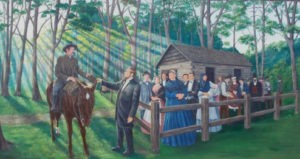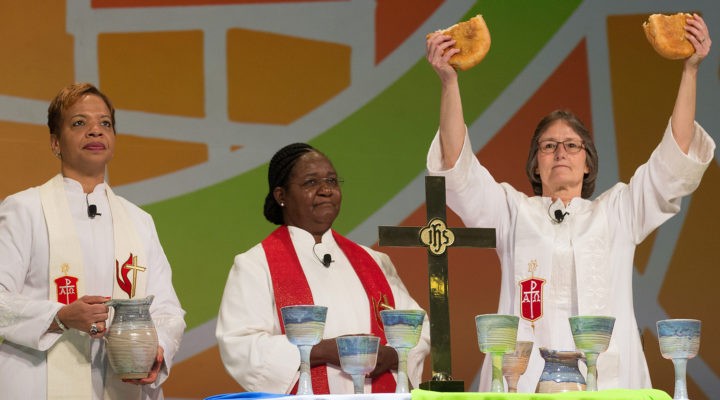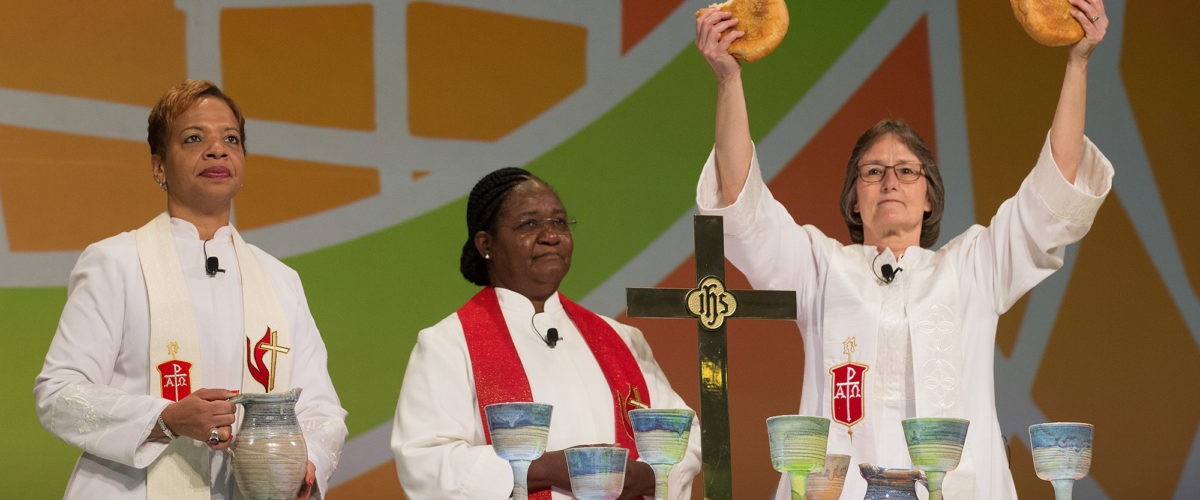Roman Catholic bishops may bar President Joe Biden from receiving Holy Communion because of his political beliefs, but United Methodists are ready to welcome him to the Lord‘s Supper without question.
Anyone who has attended Communion in a United Methodist church probably has heard this introduction: “This isn’t our church’s table. This isn’t a United Methodist table. This is the Lord’s table, and all are welcome.” Some pastors even put it more succinctly: “This is the Lord’s table, and we have no right to be checking the guest list.”
“This is the Lord’s table, and we have no right to be checking the guest list.”
While this approach puts United Methodists at odds with other Christian denominations that do “check the guest list,” the UMC has a wealth of theological scholarship to back up its Communion practices (after all, Methodism’s founder, John Wesley, was an Oxford professor). A four-year study resulted in a document, “This Holy Mystery,” which was adopted in 2004 as the official United Methodist statement of theology and practice. Congregations and small groups still study “This Holy Mystery,” which is distributed through the denomination’s local-church resource unit, Discipleship Ministries.
As with most things Methodist, the bedrock understanding of the nature and practice of the Lord’s Supper goes back to Wesley. He put prime importance on Holy Communion, also known as Eucharist (Greek for “thanksgiving”). Wesley received Communion almost daily and encouraged his followers to partake as often as possible. He saw the Lord’s Supper as one of the “means of grace,” meaning that it is a practice through which God’s Holy Spirit can enter into a person’s heart to convince them of their need to repent and believe in Jesus Christ as Savior.
United Methodists believe that once justified through repentance of sin and profession of faith, a Christian can be sanctified — “perfected in love,” as Wesley put it — through regularly receiving the Eucharist. The Book of Discipline, the church’s collection of doctrine and laws, puts it this way: “Through the regular celebration of Holy Communion, we participate in the risen presence of Jesus Christ and are thereby nourished for faithful discipleship.”
In light of the debate over whether President Biden is worthy to received Holy Communion, Tom Fuerst, lead pastor of Bluff City Church in Memphis, Tenn., wrote an article for Ministry Matters magazine in which he delved more deeply into what United Methodists believe and practice about the Lord’s Supper. He cited four beliefs:
- “Communion is God’s gift, not the church’s gift.”
- “In Communion God folds the past and future into the present.”
- “Communion even works grace into the lives of non-Christians.”
- “The Table is open to everyone.”
The last principle enables United Methodists to welcome President Biden or anyone who wishes to receive the Lord’s Supper, because as Fuerst puts it: “No one is too unworthy because no one was worthy to begin with.”
As sinners forgiven by God through Jesus Christ, we receive — not “take” — Communion because it is God’s gift.
As sinners forgiven by God through Jesus Christ, we receive — not “take” — Communion because it is God’s gift. Jesus instituted the meal as a remembrance of his sacrifice and as a sign of God’s boundless forgiveness and unfailing spiritual sustenance.
With this understanding, Communion is one of the two sacraments, along with baptism, that are reserved for ordained ministers to perform. In fact, United Methodists believe that a baptized Christian can baptize a new believer in extreme circumstances, such as imminent death or the inadvisability of waiting for an ordained minister. However, presiding at Holy Communion is reserved solely for those ministers, known as elders, who have taken ordination vows to lead and preserve “Word (preaching), Sacrament and Order (administering church organization).”
As a result of this doctrine, any supposed Eucharist not led by an elder would be considered “invalid” by the UMC. In other words, the church assigns the ordained clergy to preserve the sacredness of the Lord’s Supper rather than requiring recipients to prove their spiritual worthiness by adhering to church teachings.

A circuit-riding Methodist pastor is depicted in one of the Riverfront Murals in Vicksburg, Miss.
Methodism’s principle of preserving the sanctity of the Lord’s Supper proved to be a challenge in pioneer days when the Methodist Church was moving rapidly westward with U.S. territorial expansion. There simply weren’t enough ordained elders for each Methodist congregation to have its own pastor, and so the church developed what it calls “circuits,” a group of congregations served in rotation by a single elder. Francis Asbury, first bishop of the Methodist Church in America, was the pre-eminent “circuit rider” of his day.
Given the long distances and slow transportation of the 1800s, many Methodist congregations might have seen an elder only once a quarter each year. This reality gave rise to the practice of an alternative thanksgiving meal known as the Love Feast. Originated by the Moravian Church, a Love Feast is a meal-centered gathering led by laypeople in which participants share their gratitude for God’s gifts to them. Often baked goods such as cookies or muffins are served along with juice to emphasize the sweetness of God’s abundance. Today, Love Feasts frequently are held around harvest time in North America or as part of a Thanksgiving worship service.
The pioneer practice of infrequent Holy Communion persisted in Methodist circles until the creation of The United Methodist Church in 1968. By that time, liturgical renewal sparked by reform in the Roman Catholic Church also was spreading through Protestant denominations by way of the ecumenical movement.
Christians sought to become more united with one another, leading Protestants particularly to revisit traditions that had been abandoned beginning with the Reformation. Being only two steps removed from the Catholic Church because of its genesis as a reform movement within the Anglican Church (even though Wesley had harsh words for “popery”), many United Methodists were enthusiastic about embracing historic eucharistic liturgies.
Today the United Methodist theological debate about the Lord’s Supper centers … on whether a Eucharist presented through electronic means can be valid.
Today the United Methodist theological debate about the Lord’s Supper centers not on the worthiness of the recipient, but on whether a Eucharist presented through electronic means can be valid. In other words, can a worshiper engage in a valid Communion if one uses one’s own bread and juice (or wine) that have been blessed through words spoken by an elder over the Internet?
In the past 15 months, some United Methodist bishops have granted pastors under their supervision emergency permission to conduct “online Communion” for the sake of comforting congregations spiritually during the coronavirus pandemic. However, other bishops have held to the strict doctrine that only Eucharist received in person from an ordained elder can be considered valid. To date, there has be no definitive answer to this theological question.
For now, as vaccinations increase in the United States and churches begin to resume in-person worship settings — with coronavirus precautions — the United Methodist Church most likely will uphold its doctrine that the Lord’s Supper is only appropriate and efficacious when received face to face in community.
Thus, if he’s shut off from Holy Communion by his Catholic Church, President Biden is invited to receive at any United Methodist congregation where officially all are welcome at the Lord’s table.
Cynthia B. Astle is a veteran journalist who has covered the worldwide United Methodist Church at all levels for more than 30 years. She serves as editor of United Methodist Insight, an online journal she founded in 2011.
Related articles:
With a Catholic president in office, America’s bishops threaten to sanction him over abortion
America’s second Catholic president faces a vastly different landscape than the first
America’s two largest Christian bodies continue to become more conservative | Opinion by Laura Ellis


